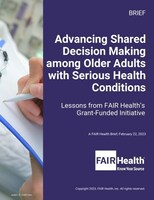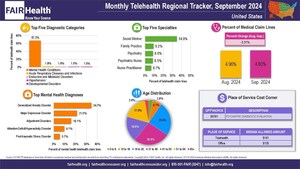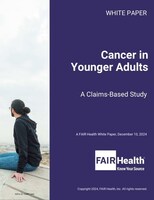FAIR Health Initiative Illuminates Need for Cost Information in Shared Decision Making for Older Adults
Sixty-Five Percent of Survey Respondents Said Older Adult Tools Helped Them Understand Healthcare Costs
Shared Decision Making Seen as a Vehicle for Patient Empowerment
NEW YORK, Feb. 22, 2023 /PRNewswire/ -- An initiative undertaken by FAIR Health—a national, independent nonprofit organization dedicated to bringing transparency to healthcare costs—revealed the need for cost information in shared decision-making discussions for adults aged 65 and over with serious health conditions. Shared decision making is the discussion between patient and/or caregiver and healthcare provider, balancing clinical options and patient preferences and values to make healthcare decisions. The initiative, generously funded by The John A. Hartford Foundation, offered actionable insights regarding the challenges older adults face when making healthcare decisions and tools with cost information to help facilitate shared decision making among older adults, family caregivers and care partners. These insights and more are included in a brief released today by FAIR Health, Advancing Shared Decision Making among Older Adults with Serious Health Conditions: Lessons from FAIR Health's Grant-Funded Initiative.
Over 18 months, the initiative resulted in the development and September 2022 launch of five new shared decision-making tools geared toward adults with serious health conditions—fast-growing prostate cancer, early-stage breast cancer, hip replacement, hip osteoarthritis and spinal stenosis. FAIR Health's decision aids combine clinical information from EBSCO's OptionGrid™ decision aids and cost data from our private healthcare claims database comprising over 40 billion claim records from 2002 to the present. In addition, FAIR Health also launched three new FH® Total Treatment Cost scenarios, which show approximate healthcare costs for a health condition over the course of a year. The new FH Total Treatment Cost tools feature major depression, heart failure and Alzheimer's disease/dementia. To offer these tools in an easy-to-access, centralized location for older patients and family caregivers, FAIR Health developed a dedicated Older Adults section for its free, award-winning website FAIR Health Consumer (fairhealthconsumer.org). The Older Adults section features the tools as well as educational content, resources, checklists with questions for patients and/or caregivers to ask their providers, and links to salient FH® Insurance Basics articles, which explain diverse topics related to the healthcare system. The tools, content and dissemination were informed by a needs assessment, which included a nationwide survey that examined how older adults navigate the healthcare system; the results were published in a February 2022 white paper.
FAIR Health promoted the tools through a dissemination campaign aimed at a wide variety of stakeholders in four key market regions (New York City, Atlanta, Los Angeles and Chicago): patients, providers, caregivers, state and federal departments of health, age-friendly organizations, offices for the aging and social workers, among others. The campaign also utilized social media such as Facebook to reach healthcare consumers and providers. Key findings from the initiative, which can be found in this brief, are summarized below.
Key Program Findings
To evaluate the initiative, FAIR Health gathered data from surveys and website analytics and conducted focus groups with patients, caregivers and providers.
- A majority of older adults, family caregivers and care partners found the content, resources and tools useful. From the September launch of the Older Adults section through the end of the grant period in December, Older Adults tools and resources received 10,312 unique visitors. Of those surveyed, 74 percent found the tools, resources and content "useful" or "very useful"; 67 percent felt that the Older Adults section increased their knowledge and understanding of shared decision making; and 65 percent of respondents agreed that the section helped them understand how to manage their healthcare costs.
- Shared decision making is perceived as a vehicle for patient empowerment. Providers, patients, family caregivers and care partners alike believed that the tools, content and resources empowered individuals to become more active participants in their health and healthcare decision making.
- Patients, family caregivers and care partners voiced frustrations around healthcare costs, billing and a lack of transparency in the healthcare system. Healthcare costs, confusing billing systems and a lack of general transparency in the healthcare system were cited as barriers to accessing care and services.
- Checklists and links to external resources were popular among older adults, family caregivers and care partners. Forty-eight percent of survey respondents stated that links to the external resources were most helpful in decision making, with an additional 39 percent saying the checklists were most helpful.
- Barriers to shared decision making exist at the point of care and at home. Barriers to shared decision making cited by the focus group participants included lack of access to technology, low health literacy and time constraints in appointments.
FAIR Health President Robin Gelburd said: "We are grateful for the support of The John A. Hartford Foundation in this important endeavor. There is a demonstrated appetite among older adults and family caregivers for cost information and resources to make healthcare decisions. Access to these tools and resources will help empower older adults to take charge of their healthcare choices."
The John A. Hartford Foundation Vice President of Program Rani E. Snyder said: "The John A. Hartford Foundation is proud to support FAIR Health in this effort to advance age-friendly care. These shared decision-making and healthcare engagement tools show promise for empowering older patients and their care partners when it comes to dealing with challenging healthcare issues and costs."
To read the brief, click here.
Follow us on Twitter @FAIRHealth
About FAIR Health
FAIR Health is a national, independent nonprofit organization that qualifies as a public charity under section 501(c)(3) of the federal tax code. It is dedicated to bringing transparency to healthcare costs and health insurance information through data products, consumer resources and health systems research support. FAIR Health possesses the nation's largest collection of private healthcare claims data, which includes over 40 billion claim records and is growing at a rate of over 2 billion claim records a year. FAIR Health licenses its privately billed data and data products—including benchmark modules, data visualizations, custom analytics and market indices—to commercial insurers and self-insurers, employers, providers, hospitals and healthcare systems, government agencies, researchers and others. Certified by the Centers for Medicare & Medicaid Services (CMS) as a national Qualified Entity, FAIR Health also receives data representing the experience of all individuals enrolled in traditional Medicare Parts A, B and D; FAIR Health includes among the private claims data in its database, data on Medicare Advantage enrollees. FAIR Health can produce insightful analytic reports and data products based on combined Medicare and commercial claims data for government, providers, payors and other authorized users. FAIR Health's systems for processing and storing protected health information have earned HITRUST CSF certification and achieved AICPA SOC 2 compliance by meeting the rigorous data security requirements of these standards. As a testament to the reliability and objectivity of FAIR Health data, the data have been incorporated in statutes and regulations around the country and designated as the official, neutral data source for a variety of state health programs, including workers' compensation and personal injury protection (PIP) programs. FAIR Health data serve as an official reference point in support of certain state balance billing laws that protect consumers against bills for surprise out-of-network and emergency services. FAIR Health also uses its database to power a free consumer website available in English and Spanish, which enables consumers to estimate and plan for their healthcare expenditures and offers a rich educational platform on health insurance. An English/Spanish mobile app offers the same educational platform in a concise format and links to the cost estimation tools. The website has been honored by the White House Summit on Smart Disclosure, the Agency for Healthcare Research and Quality (AHRQ), URAC, the eHealthcare Leadership Awards, appPicker, Employee Benefit News and Kiplinger's Personal Finance. FAIR Health also is named a top resource for patients in Dr. Marty Makary's book The Price We Pay: What Broke American Health Care—and How to Fix It and Dr. Elisabeth Rosenthal's book An American Sickness: How Healthcare Became Big Business and How You Can Take It Back. For more information on FAIR Health, visit fairhealth.org.
Contact:
Rachel Kent
Senior Director of Marketing
FAIR Health
646-396-0795
[email protected]
SOURCE FAIR Health

WANT YOUR COMPANY'S NEWS FEATURED ON PRNEWSWIRE.COM?
Newsrooms &
Influencers
Digital Media
Outlets
Journalists
Opted In






Share this article